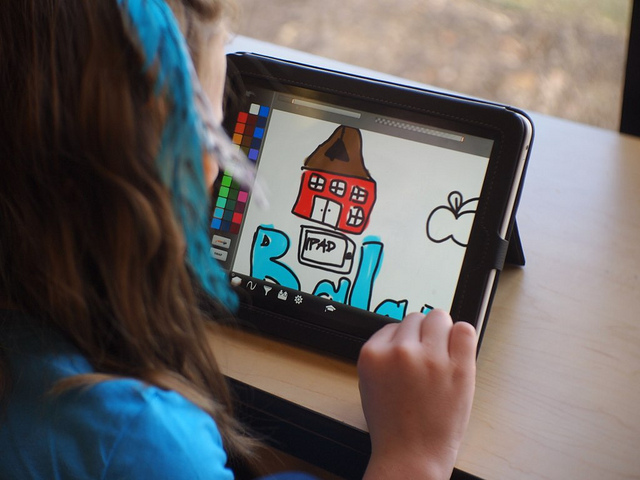5 Things That Parents Should Know About Children and Screen Time

As the debate continues about the effects of screen time on kids, parents need to educate themselves. Screen time is simply the act of watching tv, viewing a video on your iPad, playing a game on your phone, participating in social media, etc. There is a ton of research concerning screen time, and the pros and cons of children being exposed to technology. With all of the information available, it can take some time to read it all and make an informed decision. Also, most research is written in academic jargon that is indecipherable to the average person. But don’t worry, we decided to make your job a little easier. In this piece, we will discuss 5 things that parents need to know about screen time and children.
1. You should be aware of the AAP guidelines. Periodically, the American Association of Pediatrics releases guidelines on acceptable levels and forms of screen use for kids of various ages. The latest guidelines were published in October 2016 and are as follows:
- Children under 18 months should not be exposed to screen time, other that video chatting.
- Childen aged 18 months to age 2 can view high-quality programs or apps, but only if a responsible caregiver or adult supervises them and assists them in processing and understanding what they are seeing.
- Childen from ages 2-4 can have up to one hour a day of screen time, but only if an adult supervises them.
- Children aged 6 years and older need limits on their screen time and how they use it.
2. Lots of screen time has been linked to diabetes. Children who are permitted to have over three hours of screen time a day are in danger of developing diabetes, new research suggests. The study found that kids who were glued to their screens for at least three hours a day scored higher on measures of muscle to fat ratio and had higher amounts of resistance to insulin than their classmates who spent an hour or less staring at screen media. At any rate, the researchers forewarned that the study does not demonstrate that increased screen time itself brings about an increased risk of developing diabetes.
3. There are some benefits of screen time. Contrary to popular belief, there are some benefits of screen time. It can have a positive influence on your child, especially when:
- You assist your child in making smart decisions about what content to consume or what games to play.
- You serve as a guide during your child’s technology use, explaining to them what is happening on their favorite tv show or video game.
- Making sure that your child has access to high-quality content.
- Encouraging your child to use screen time to pursue their passions and interests.
- Challenging your child to use their screen time to learn a new skill.
4. Screen time has a lot of negative consequences. The use of screen time can have a lot of physical, developmental and safety risks. They are as follows:
Physical concerns. Viewing a screen intensely and for extended periods of time can cause eye irritations, fatigue, and headaches. Looking down while viewing a screen can cause neck and spine issues. Being sedentary for extended periods of times can lead to childhood obesity. You can mitigate these problems by encouraging your child to look away from the screen periodically, keeping their neck upright, taking regular breaks to move about, and engaging in physical activities.
Development concerns. Screen time can have an impact on your children’s language and social skill development. Children need interaction with peers and adults to develop these core competencies. In older children, it can affect their ability to carry on a casual or intelligent conversation, maintain focus, or read other people’s body language. You can mitigate these issues by balancing their screen time with other activities.
Safety concerns. You child is sure to encounter inappropriate content and people on the internet. You can mitigate this risk by setting taking proper precautions. You can set the privacy settings on the devices that your child has access to. Also, teach your child to use the internet responsibly. Remind them that if they do not, they could use the privilege.
Media messages. Screen-based media can influence your child’s thoughts, ideas, and behavior. For instance, by watching screen-based media, your child can be affected by the bad behavior of their favorite cartoon character, form stereotypes of various groups, or internalize violent images that they see on their screens. You can mitigate this risk by assisting your child in developing digital media literacy so they can understand your dangers and concerns.
5. Screens can keep kids up at night. Exposure to LED-illuminated devices at night suppresses melatonin and makes it more difficult for you to got to sleep. It disrupts your circadian rhythm. A Scientific American article found that subjects who spent their evenings reading for an extended period on an e-reader needed more time to fall asleep. In effect, they experienced less REM sleep and felt tired for hours after they woke up in the morning, even if they received the same amount of sleep as the control group. Pediatricians see problems like this with their patients all the time. When they ask what type of screen media they have been consuming, patients usually report that they have viewed social media, played video games or watched TV within hours of going to bed. Disruptions to the circadian rhythm is also a major contributor to ADHD and other behavioral and mood disorders. However, there is some good news; you can prevent this from happening by reducing your child’s screen media consumption. However, this is easier said than done.
Did we miss anything?






